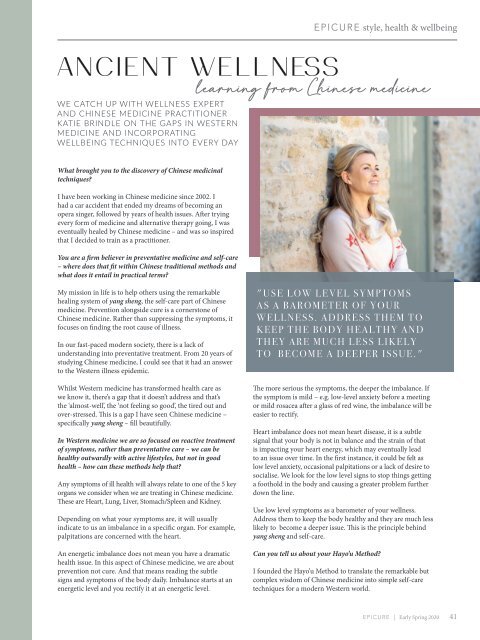EPICURE Early Spring 2020
The Wellness Edition - we look at ways to live well in 2020, tips from traditional medicine and healthy dishes that still feel comforting. Plus, we interview chef Michael Caines, take a foodie trip to Santa Barbara. If you're planning your wedding this year, you'll love our special guide to local suppliers.
The Wellness Edition - we look at ways to live well in 2020, tips from traditional medicine and healthy dishes that still feel comforting. Plus, we interview chef Michael Caines, take a foodie trip to Santa Barbara. If you're planning your wedding this year, you'll love our special guide to local suppliers.
You also want an ePaper? Increase the reach of your titles
YUMPU automatically turns print PDFs into web optimized ePapers that Google loves.
ANCIENT WELLNESS<br />
WE CATCH UP WITH WELLNESS EXPERT<br />
AND CHINESE MEDICINE PRACTITIONER<br />
KATIE BRINDLE ON THE GAPS IN WESTERN<br />
MEDICINE AND INCORPORATING<br />
WELLBEING TECHNIQUES INTO EVERY DAY<br />
<strong>EPICURE</strong> style, health & wellbeing<br />
learning from C hinese medicine<br />
What brought you to the discovery of Chinese medicinal<br />
techniques?<br />
I have been working in Chinese medicine since 2002. I<br />
had a car accident that ended my dreams of becoming an<br />
opera singer, followed by years of health issues. After trying<br />
every form of medicine and alternative therapy going, I was<br />
eventually healed by Chinese medicine – and was so inspired<br />
that I decided to train as a practitioner.<br />
You are a firm believer in preventative medicine and self-care<br />
– where does that fit within Chinese traditional methods and<br />
what does it entail in practical terms?<br />
My mission in life is to help others using the remarkable<br />
healing system of yang sheng, the self-care part of Chinese<br />
medicine. Prevention alongside cure is a cornerstone of<br />
Chinese medicine. Rather than suppressing the symptoms, it<br />
focuses on finding the root cause of illness.<br />
In our fast-paced modern society, there is a lack of<br />
understanding into preventative treatment. From 20 years of<br />
studying Chinese medicine, I could see that it had an answer<br />
to the Western illness epidemic.<br />
Whilst Western medicine has transformed health care as<br />
we know it, there’s a gap that it doesn’t address and that’s<br />
the ‘almost-well’, the ‘not feeling so good’, the tired out and<br />
over-stressed. This is a gap I have seen Chinese medicine –<br />
specifically yang sheng – fill beautifully.<br />
In Western medicine we are so focused on reactive treatment<br />
of symptoms, rather than preventative care – we can be<br />
healthy outwardly with active lifestyles, but not in good<br />
health – how can these methods help that?<br />
Any symptoms of ill health will always relate to one of the 5 key<br />
organs we consider when we are treating in Chinese medicine.<br />
These are Heart, Lung, Liver, Stomach/Spleen and Kidney.<br />
Depending on what your symptoms are, it will usually<br />
indicate to us an imbalance in a specific organ. For example,<br />
palpitations are concerned with the heart.<br />
An energetic imbalance does not mean you have a dramatic<br />
health issue. In this aspect of Chinese medicine, we are about<br />
prevention not cure. And that means reading the subtle<br />
signs and symptoms of the body daily. Imbalance starts at an<br />
energetic level and you rectify it at an energetic level.<br />
"USE LOW LEVEL SYMPTOMS<br />
AS A BAROMETER OF YOUR<br />
WELLNESS. ADDRESS THEM TO<br />
KEEP THE BODY HEALTHY AND<br />
THEY ARE MUCH LESS LIKELY<br />
TO BECOME A DEEPER ISSUE."<br />
The more serious the symptoms, the deeper the imbalance. If<br />
the symptom is mild – e.g. low-level anxiety before a meeting<br />
or mild rosacea after a glass of red wine, the imbalance will be<br />
easier to rectify.<br />
Heart imbalance does not mean heart disease, it is a subtle<br />
signal that your body is not in balance and the strain of that<br />
is impacting your heart energy, which may eventually lead<br />
to an issue over time. In the first instance, it could be felt as<br />
low level anxiety, occasional palpitations or a lack of desire to<br />
socialise. We look for the low level signs to stop things getting<br />
a foothold in the body and causing a greater problem further<br />
down the line.<br />
Use low level symptoms as a barometer of your wellness.<br />
Address them to keep the body healthy and they are much less<br />
likely to become a deeper issue. This is the principle behind<br />
yang sheng and self-care.<br />
Can you tell us about your Hayo’u Method?<br />
I founded the Hayo’u Method to translate the remarkable but<br />
complex wisdom of Chinese medicine into simple self-care<br />
techniques for a modern Western world.<br />
<strong>EPICURE</strong> | <strong>Early</strong> <strong>Spring</strong> <strong>2020</strong> 41<br />
<strong>EPICURE</strong> <strong>Early</strong> <strong>Spring</strong> <strong>2020</strong>.indd 41 24/01/<strong>2020</strong> 15:29


















